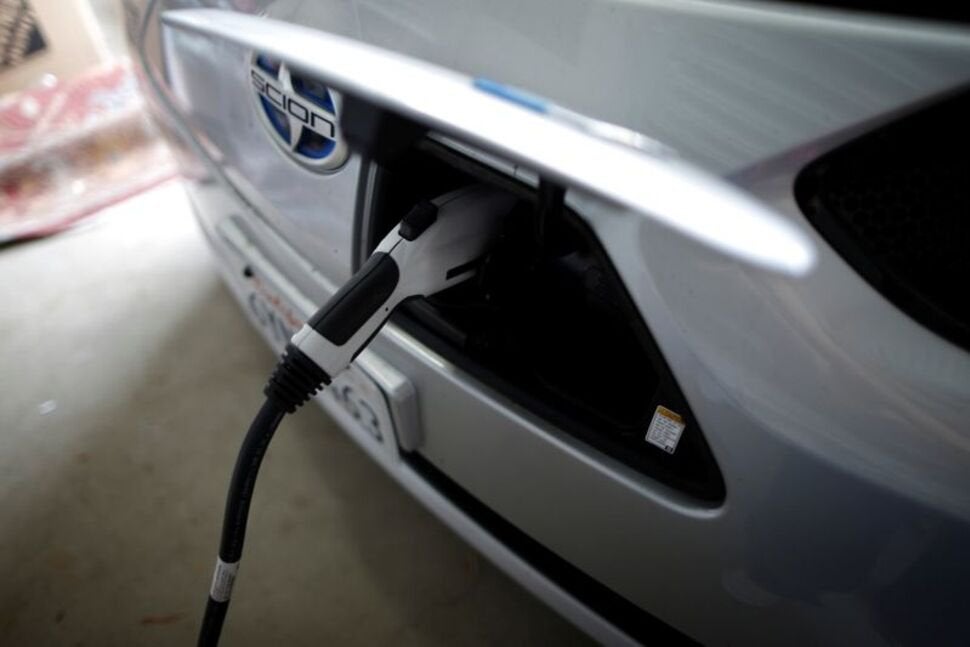
Fast charging stations are installed at public locations where electric vehicles can be charged in a short period of time. The charging times depend on the battery's power and the settings of your charging station. Fast chargers can charge an EV's battery up to 80% in 20 minutes. The last 20% take about a minute. Comparatively, a typical home charger will take 2 to 3 hours to charge an EV’s battery to full capacity.
While charging at a fast-charge station is convenient, it can be expensive. However, some models are eligible for free charging. A Ford Mustang Mach-E, for example, can be charged up to 80 percent in just 15 minutes. These chargers attach to the EV's batteries and are connected to its electrical system. This limits the power available to maintain a safe level of battery charge.
They are usually found at public locations such as motorway service stations, and other public locations. They can also easily be installed at home. Although they are more expensive than quick chargers, these chargers can provide a more reliable and faster charge. These chargers generally provide less than 50 kW of power. That means that a standard small EV can usually be fully charged in just three to four hour. Some EVs like the Nissan Leaf might require more time to fully recharge.

Public charging stations can also provide ultra-rapid charge. Using the Open Charge Map app, drivers can locate a suitable location and quickly determine the charging rate. They can search by zip code or city to locate a charging spot in their vicinity. The app features a wide range of fast charging stations. Some sites allow for free charging, especially for students or members of the NRMA.
Fastned is the tenth UK station and features eight ultra-rapid chargers. It is located in Hamilton's Palace Grounds Retail Park and is powered entirely by renewable energy. The new site supports a commitment by the Scottish Government to eliminate petrol- and diesel cars completely by 2030.
The EdgeEV70 charging station provides clean three-phase power for a stable and consistent charging experience. The station is also equipped with a proprietary technology that speeds up charging. The power source is manufactured by EdgeEnergy, a subsidiary of Single Phase Power Solutions. The power will not strain the local electricity network and won't need costly upgrades.
Chargefox operates a nationwide network charging stations. They can provide 400km of range in just 15 minutes. Their network extends from Sydney to coastal regions of Northern NSW. They've forged partnerships and delivered world-class charging tech to most of the major EV manufacturer. They have reduced carbon emissions to the tune of 90 tonnes per month.

Since 2011, Chargefox installs charging points at Australian service stations and on major highways. The company's EV-charging network has contributed to reducing carbon emissions by around 90 tonnes per year. To use the network, a user must register and agree to the terms and conditions. Members of the network have access to many benefits, including a 20% discount on all charges.
FAQ
What do I need to know about car mechanics?
To work as an auto technician, you don’t need to know much about cars. All you need to know is how to fix things. It's why many people begin to fix things by fitting brake pads or changing tires.
It is important to be able to read and understand diagrams as well as written instructions. You will also need to understand how parts should be replaced or repaired.
You should not attempt to fix vehicles without proper training and guidance. This is especially true if you deal with expensive components such as engines or transmissions.
In fact, even though you won't need to know much about cars, you will need to thoroughly know the basics of mechanical engineering and physics. This is how you understand the mechanisms behind engines and brakes.
It is also important to remember that you will need to be able to handle many situations. If your vehicle has been in an accident, you might need to be able to handle it. Also, you'll need to be familiar with dealing with accidents or breakdowns.
It is important to be open to learning new skills quickly. It is important to be able both to diagnose problems and perform simple maintenance tasks, such as tightening nuts.
What qualifications do you need to be a truck-mechanic?
You don't have formal qualifications for this role, but you are very experienced working on trucks and engines. You are a valuable asset as you can quickly diagnose and solve problems efficiently.
Additionally, you have a solid knowledge of diesel technology that will enable you to determine what parts are necessary to repair our vehicles.
How can I prepare to become a mechanic apprentice?
It is important to have an understanding of what you are going into. You need to understand the mechanics of cars and how they work. This will allow you to be prepared for your first day at work.
Also, you need to know how fix simple problems, such as tires and lights that aren't working.
This article will show you how to diagnose and fix issues.
For the purpose of putting them back together again, you'll need to be able to identify how each piece fits together.
And finally, you must know how to use tools safely and efficiently.
All of these factors will allow you to become a skilled mechanic.
Is it worthwhile to become a mechanic?
The answer depends on what you are looking for in life. If money is your goal, then you can answer "yes". But if you are searching for meaning and purpose, then you should not answer this question.
If you don’t have any mechanical skills, it’s pointless to get into it. It will just waste your time. It will not make you rich. It won't make you famous. It's unlikely that it will change your life.
This would require you to spend many years learning how to properly do everything. Also, you would need to hire someone else to fix it if it broke down. It's the reason most people don't bother. They find something more worthwhile.
In conclusion, if money is your main goal, you should go ahead. If you are looking for a fulfilling life, however, then stay clear of the mechanics' industry.
What length of an automotive course is it?
A three-year course in automotive is required.
The first year is dedicated to theory and learning about cars. Practical training is the second year. You will learn to drive, fix engines and perform other tasks around the car. You will spend the final year working in a local garage to gain real-world experience.
What are the requirements for an automobile technician?
You must have high school, or GED, and be able to read and write well in English and math. Also, you must be able read and write. The written test will be passed and you will then have to take several practical exams before you can begin work.
Statistics
- According to the BLS, total auto technician employment is expected to exceed 705,000 by 2030. (uti.edu)
- Apprentice mechanics earn significantly less hourly than mechanics who have completed training, with a median wage of approximately $14.50 an hour, according to PayScale. (jobhero.com)
- There were 749,900 jobs available for automotive service technicians and mechanics in 2016, which is expected to grow by six percent through 2026. (jobhero.com)
External Links
How To
How to be an Automotive Technician
An automotive technician performs repairs and maintains vehicles. He/she works at car dealerships, auto shops, garages, service centers, etc. He/she works with customers to repair their cars and trucks, ATVs or snowmobiles. An automotive technician must know how to diagnose problems and perform repairs efficiently, safely, accurately, quickly, and correctly.
An associate degree from a vocational school is required for anyone who wishes to become an automotive technician. After completing the program, he/she must take the National Institute for Automotive Service Excellence certification exam. ASE stands as American Society of Mechanical Engineers. Two sections make up the ASE certification examination. The first section tests for mechanical knowledge, the second for practical skills. To take the test, you must visit one of the approved testing locations. You can find these locations online or through your local automobile dealer.
A candidate must pass the state exam after passing the test to become an automotive technician. It varies depending on the location of the applicant. For example, some states require candidates to attend a training course, while others allow them to study independently. Some states permit technicians to work immediately after they are granted their license. Others require them to wait at least six consecutive months before they can be licensed.
To become an automotive technician, one must apply at a local dealership. Most employees who are hired start as apprentices. Apprenticeships typically last three years. During this time, a student learns how to perform basic repairs, such as changing oil, adjusting brakes, replacing tires, cleaning spark plugs, inspecting engine compartments, and performing routine maintenance. Some students are able to perform more advanced repairs such as replacing shocks and installing air filters. Classes are offered by most schools during regular business hours. Some schools offer evening classes, however.
When a student has completed his/her apprenticeship, they become a journeyman. Journeymen spend typically four to five years learning to install major systems such as transmissions and differentials, steering gear, suspensions and drive shafts. They learn how to do complex repairs such as remanufacturing engines, rebuilding transmissives, and troubleshooting electronic components. Many employers prefer hiring journeymen because they know the job well and understand what the customer expects.
Candidates who pass the required exams are eligible for a license. According to the Bureau of Labor Statistics, nearly 1.7 million automotive mechanic jobs were available in 2010. This number was expected increase 18% between 2009 - 2020. A candidate who plans to open a shop should expect to spend many thousands of dollars on equipment and supplies.
The salary of an automotive technician will depend on many factors including where you live, your education level, experience and the type of employer. On average, a jobless person could expect to earn $20,000 annually. An individual with a high school diploma can earn about $21,000 per annum. A bachelor's degree is equivalent to approximately $24,000 annually. Technicians with a bachelor’s degree made about $27,000 annually. The average annual salary for those with master's degrees was $32,000. Salary increases can be common. A professional who earns less that $30,000 today could reasonably expect a $40,000 increase in the next few decades.